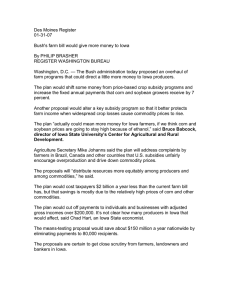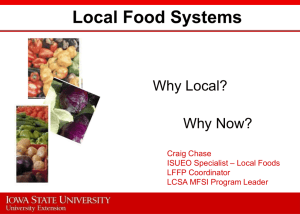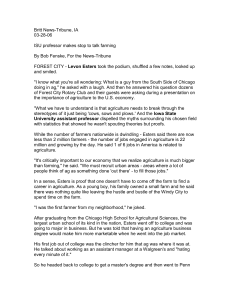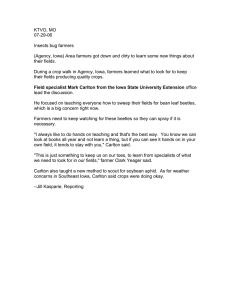Des Moines Register 07-20-07
advertisement
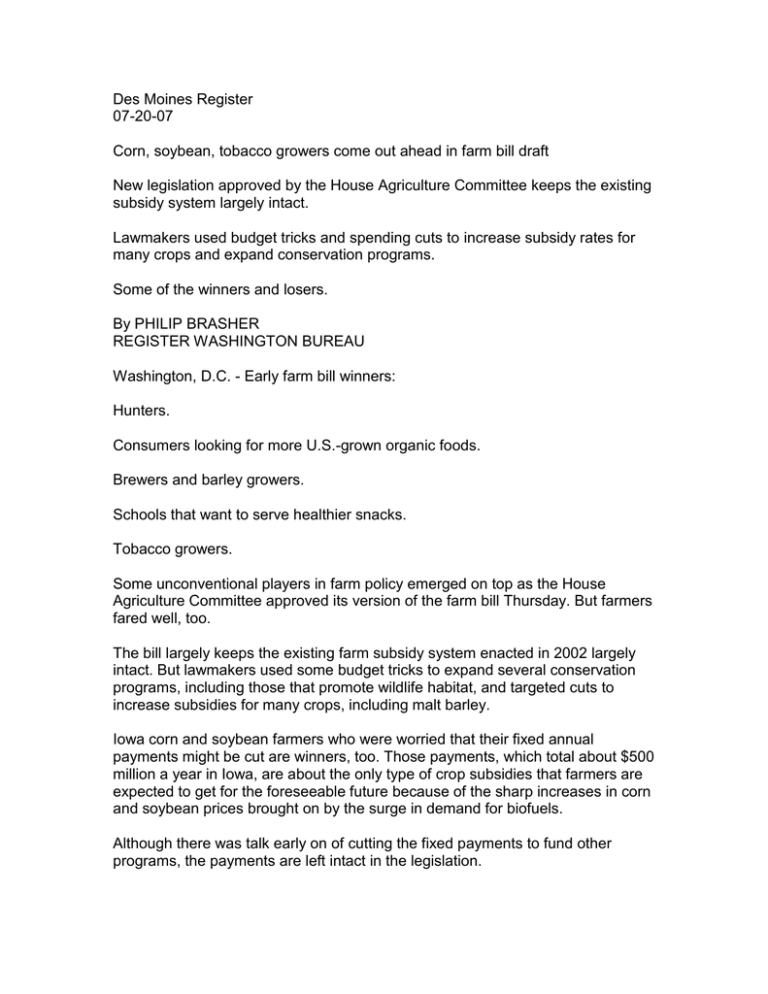
Des Moines Register 07-20-07 Corn, soybean, tobacco growers come out ahead in farm bill draft New legislation approved by the House Agriculture Committee keeps the existing subsidy system largely intact. Lawmakers used budget tricks and spending cuts to increase subsidy rates for many crops and expand conservation programs. Some of the winners and losers. By PHILIP BRASHER REGISTER WASHINGTON BUREAU Washington, D.C. - Early farm bill winners: Hunters. Consumers looking for more U.S.-grown organic foods. Brewers and barley growers. Schools that want to serve healthier snacks. Tobacco growers. Some unconventional players in farm policy emerged on top as the House Agriculture Committee approved its version of the farm bill Thursday. But farmers fared well, too. The bill largely keeps the existing farm subsidy system enacted in 2002 largely intact. But lawmakers used some budget tricks to expand several conservation programs, including those that promote wildlife habitat, and targeted cuts to increase subsidies for many crops, including malt barley. Iowa corn and soybean farmers who were worried that their fixed annual payments might be cut are winners, too. Those payments, which total about $500 million a year in Iowa, are about the only type of crop subsidies that farmers are expected to get for the foreseeable future because of the sharp increases in corn and soybean prices brought on by the surge in demand for biofuels. Although there was talk early on of cutting the fixed payments to fund other programs, the payments are left intact in the legislation. As a result, the bill will have little effect on Iowa agriculture, said Bruce Babcock, director of Iowa State University's Center for Agricultural and Rural Development. "Iowa agriculture's fortunes are determined more now by biofuels policy than commodity policy," he said. A look at some of the winners and losers in the bill: Hunters, fishers, wildlife enthusiasts The chairman of the committee, Rep. Collin Peterson, D-Minn., is an avid hunter, and the bill shows it. The legislation creates an "open fields" grant program to help states pay landowners to open their land to hunting and fishing. "Sportsmen win because it ... gives them places to go," said Dave Nomsen of Pheasants Forever, an advocacy group. The Wetlands Reserve Program, which pays for restoring and maintaining sloughs, prairie potholes and other wetlands, was expanded from 2.3 million to 3.6 million acres. The program is popular with people seeking to hunt ducks and other wildlife. Wildlife groups fought off pressure to shrink the Conservation Reserve Program, which pays farmers to retire environmentally sensitive land. Under the bill, the enrollment cap remains at 39.2 million acres. More than 36 acres are currently enrolled nationwide, including 2 million in Iowa. Organic food The bill attempts to increase availability of organic foods. It authorizes up to $10,000 per farm in cost-share payments per year to help farms convert to organic agriculture. Transitioning to organic can be a costly process because farms can't get the higher prices for organic commodities until they've been following organic practices for at least three years. The bill also has additional money for organic research and certification and it requires the U.S. Department of Agriculture to start collecting data on organic commodities. School snacks More schools will get to participate in a program that provides free fruits and vegetables as snacks. At least 35 schools in every state will be eligible for the program. The program is now limited to 25 schools in Iowa and each of 13 other states. Advocates of the program say it's needed to address the nation's obesity problem. It's also a top priority with fruit and vegetable growers, who don't benefit from traditional crop subsidies. Tobacco growers The bill benefits some not-so-healthy crops, too. U.S. tobacco would qualify for a program that pays for promoting overseas sales of American commodities, under a provision added to the bill by a North Carolina lawmaker. The provision is certain to be attacked by critics of the tobacco industry. But the measure has the enthusiastic support of Peterson, who is a smoker. "In my opinion we just have too much telling people what they should be doing," the committee chairman said. Brewers The bill creates a special subsidy for malting barley to encourage more farmers to grow the crop. Farmers would be guaranteed a price of $2.50 per bushel, 65 cents more than the current subsidy rate for conventional barley. At today's strong market prices - barley is selling in North Dakota for about $3.60 a bushel - the higher subsidy rate isn't needed, but it would encourage farmers to keep growing the crop when prices fall. Conservation Security Program One of the biggest losers in the House farm bill is the Conservation Security Program, enacted in 2002 to reward farmers for practices that prevent pollution and improve wildlife habitat. The program has been hurt by budget cuts, and the House bill would block new enrollments in the program until 2012. The House won't have the last word on the program, however. The program's author, Iowa Democrat Tom Harkin, is chairman of the Senate Agriculture Committee. He has not yet released a draft bill. Biodiesel producers The bill revives a special subsidy program that will help biodiesel plants cope with the rising price of soybeans and soybean oil. Conventional corn ethanol producers would no longer be eligible for the subsidies. Wealthy landowners People who make more than $1 million a year, or as little as $500,000 if they don't get most of their income from agriculture, would be cut off from farm subsidies and conservation payments. Under current law, the limit is $2.5 million. Reporter Philip Brasher can be reached at (202) 906-8138 or pbrasher@dmreg.com
